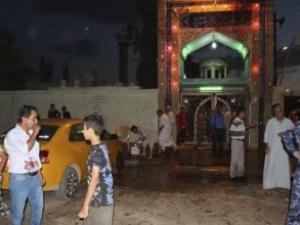Short Description
As tension is rapidly increasing between Sunnis and Shiite, mosques and shrines are falling victims.
As tension is rapidly increasing between Sunnis and Shiite, mosques and shrines are falling victims to a simmering sectarian violence in the pivotal Arab country.
“There is an increase in the frequency of reciprocal attacks targeting Sunni and Shiite mosques,” political analyst Ihsan al-Shammari told Agence France-Presse (AFP) on Monday, May 20.
“It is a war on mosques.”
Mosques have been the target of attacks in different Iraqi cities in the past few months.
In one of the deadliest attacks, two bombs exploded near the Sunni Saria mosque in Baquba, north of Baghdad, after the weekly prayers on Friday.
One device blew up as worshippers were leaving, and the second went off after people gathered at the scene of the first blast, killing a total of 41 people.
The attacks came after a suicide bomber detonated an explosives-rigged belt on Thursday at the entrance to Al-Zahraa husseiniyah (shrine), where family members were receiving condolences for victims of violence the day before, killing at least 12 people.
The attacks have led to increase the already-simmering sectarian tension between Sunnis and Shiites in Iraq.
Trading accusatios over the responsibility of the attacks, Sunnis and Shiites blame the other side.
Sheikh Sami al-Massudi, deputy head of the Shiite endowment which manages Shiite religious sites in Iraq, said more than 45 mosques and husseiniyahs belonging to the endowment have been targeted in 2013.
An official from the Sunni endowment said that more than 10 mosques had come under attack in the past month alone.
“We are threatened, to the point that we did not go to work last Monday after we received threats,” the official said.
Sectarian tension has been high in Iraq in recent months over Sunni accusations of the Shiite government of Premier Nouri al-Maliki of marginalizing their community.
Many Sunnis feel they have been shunted aside in the power-sharing agreement that Washington touts as a young democracy.
Staying Away
Worried of being caught in the raging war, many Sunni and Shiite worshippers chose to avoid praying at mosques.
“I stopped going to pray after the closure of the mosque near our house because of the attacks,” said Ihsan Ahmed, a 25-year-old Sunni.
A bomb killed the muezzin, who calls worshippers to prayer, at the mosque about two weeks ago, Ahmed said.
“All this happened in front of my eyes. How can I go again? Even my wife and my children prevent me from going,” he said.
Ali, a 29-year-old Shiite, said that some people have become afraid of going to husseiniyahs for prayers as well.
“People have become reluctant to go to husseiniyahs, but I did not stop,” Ali said.
Trying to bridge the widening divisions, Maliki called on Sunday for joint Shiite-Sunni prayers on Fridays in a major Baghdad mosque.
“Those who target mosques are enemies of Sunnis and Shiites alike, and are planning to ignite (sectarian) strife,” he said in a statement.
United Nations envoy Martin Kobler has voiced similar concerns.
“It is the responsibility of all leaders to stop the bloodshed,” Kobler said.
“Small children are burned alive in cars. Worshippers are cut down outside their own mosques. This is beyond unacceptable.”
Violence in Iraq has ebbed since the height of sectarian violence in 2006-2007, when suicide bombers and hit squads targeted Sunni and Shiite communities in attacks that killed thousands of people.
Iraq is still fighting a stubborn, lower-grade insurgency with Sunni and Shiite militias, who US officials say are backed by Iran, still staging daily attacks.
http://www.onislam.net/english/news/middle-east/462785-war-rages-on-iraqi-mosques.html






![نصيحتي لك: اذكر الله [1 / 12] نصيحتي لك: اذكر الله [1 / 12]](https://www.islamstory.com/images/upload/content_thumbs/1913613138ragheb-al-serjany-videos.jpg)


Comments
Send your comment